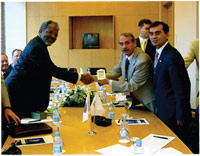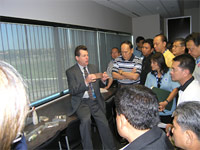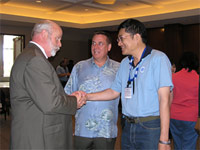 |
|||||||||||||||||

Police Studies |
Turkey's secular mind tilts West, while its Islamic heart leans East. That alone makes Turkey critical geography, but its location straddling Europe and the Middle East also means Turkey is a nexus for terrorism, organized crime and drug trafficking between Europe and Asia.
It's a tough country to police, and while the Turkish National Police have modern technology and good leadership, they are also hamstrung by bureaucracy and centralization. But that's changing, and UNT is at the core of a steady transformation aimed at creating a more open and progressive system. In fact, within the next decade, many of the top police posts in Turkey — and in countries throughout Southeast Asia — may be held by graduates of UNT-led programs. A model for others Coordinated by Robert Taylor, chair of UNT's Department of Criminal Justice, the Turkish Institute for Police Studies (TIPS) brings mid-level managers of the Turkish National Police to the United States to earn master's and doctoral degrees. What they learn will help them modernize police leadership as part of Turkey's preparations to potentially join the European Union.
That effort is critical, Taylor says. "Turkey is the model for the Middle East — it's the only secular democratic Islamic country in the world," Taylor says. "It is a very important model for other countries, particularly those struggling with radical Islamic movements in the region." TIPS students gain broad leadership and technical skills and learn new methods for fighting terrorism, drugs, corruption and other crimes. Taylor projects that the program eventually may result in a less bureaucratic, less centralized police force with a strong focus on rooting out corruption and establishing a professional approach to fighting crime and terrorism. Sharing information One of the TIPS students is Ismail Dincer Gunes ('01 M.S.), who normally serves on the faculty of the Turkish National Police Academy but is currently working toward a Ph.D. in sociology at UNT. Gunes believes the program may eventually change the entire Turkish police culture. "Change the individuals, and they will eventually change the organization, because the organization is the sum of the individuals," Gunes says. "In 10 to 15 years, we will have maybe 150 police chiefs in Turkey with Ph.D.s. It will have a huge impact on the organization." Samih Teymur ('04 M.S.), an Ankara police major and general coordinator for the Turkish students, thinks TIPS' greatest value lies in "creating a connection between law enforcement in Turkey and in the United States." "We learn about each other. We start to share our information," he says. Teymur believes the program could have positive spillover effects for other Muslim countries. Just as the Turks come to the United States to advance their education, he explains, nearby Caucasus-region nations (Azerbaijan, Georgia, Kyrgyzstan, Kazakhstan, Turkmenistan and Uzbekistan) send students to Turkey for education and training, where they will be exposed to some of the same ideas. Unique training Taylor anticipates having an even wider impact with a similar but unrelated pilot program that began this fall. The program will provide intensive training and education, first to high-level justice officials from Thailand and then to their counterparts from other Southeast Asian nations. "My goal is to establish an Asian justice center," Taylor says. "Southeast Asia now is a hotbed for terrorism, human trafficking and credit card fraud. This project has the potential to dwarf the Turkish program in both scope and size." That will take some doing. Since the first group of 11 Turkish police managers arrived in 1999, nearly 200 have participated in the TIPS program. All spend at least an initial fall semester at UNT taking one or two graduate-level courses about the American criminal justice system and, if necessary, building language skills in UNT's Intensive English Language Institute. Most then transfer to one of about 30 American universities that are partners with UNT to complete master's or doctoral work. Allowing students to earn degrees through many of the nation's top universities, rather than just one, helps them gain varied perspectives and makes TIPS unique, Taylor notes. "There is no program anywhere in the country like this, to my knowledge, where there is a relationship with a country that sends students to multiple universities here in the United States through one portal like UNT," Taylor says. Working for the future About five to eight of the students stay at UNT each year, with about the same number eventually earning an advanced degree. Most pursue degrees in criminal justice, political science, information science, public administration, sociology and public policy. The university now has graduated its first four TIPS doctoral students, and one — Suleyman Ozeren ('01 M.S., '05 Ph.D.), who earned his Ph.D. in information science, researching cyberterrorism — was recognized at the August 2005 commencement by UNT President Norval Pohl for his outstanding work. The Turkish government pays their tuition and salaries and helps support their families, to the tune of more than $5 million over the last five years. "It's not just spending a couple of years here," Gunes says. "We are working for the future and getting more knowledge. My organization will benefit from my experience here." Successful as TIPS is, training enough officers to have a major impact on the national police in Turkey, Taylor notes it is gradually winding down, with declining but continuing future enrollment. "We have accomplished a lot in the last six years," he says. "It's a natural time to catch our breath and expand our model to other countries." Southeast Asia program
As part of the program for Southeast Asian police officials launched this fall, 30 high-level judges, prosecutors and investigators from Thailand came to Denton. They spent two weeks in intensive classes on policing issues such as terrorism and human trafficking before returning home. Several UNT faculty members now plan to visit Thailand for a month of training there. Unlike the Turkish government, however, the Thais are more interested in earning master's than doctoral degrees.
Although details haven't been finalized, Taylor expects the new program will lead to a concentrated one-year master's-level training and education program that may ultimately spread to the nine other countries of the Association of Southeast Asian Nations. He is searching for $2 to $3 million in funding for the program from American governmental agencies and corporations, private donors and the Thai government. Vitaya Suriyawong, who oversees the training of justice personnel in Thailand, says the Thai justice officials particularly wanted exposure to the American justice system with its thousands of local police jurisdictions. "We have only one jurisdiction in Thailand, with a long chain of command," he says. "We are trying to decentralize the police force to be more accountable to local people, so we were wondering how the multiple systems work in the U.S." Though the UNT program is short, he notes that all the Thai students have more than 20 years of experience and so can quickly perceive how what they learn applies to their own situation. "If these people who are active change agents see the system in the U.S., they will be able to make changes at home," Suriyawong says. Col. Wichayuth Chongpayuha, director of information and communications technology with the Thai Ministry of Justice, says he was especially interested in learning about U.S. approaches to white collar crimes, cyber crime, computer hacking and fraud that are common to both nations. As his country works to improve its national justice system, "whatever we are going to do, we can refer to what we have learned here," he says. Perspectives Taylor believes both programs are vitally important to help tumultuous regions develop more equitable police systems. Turkey is also dispatching ranking officers, in much smaller numbers, to universities in 10 other nations, including the United Kingdom, France, Germany, Italy and Japan. "We want to get many perspectives. We aren't just going to copy the American way or any other way," Gunes says. "There is not just one perfect system. There are problems with the U.S. system and the Turkish system. We are trying to see the differences and create a middle way that may be better than either."
|
||||||||||||||||||||||||||||||||||||||||||||||||||||



